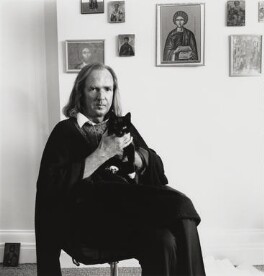


TavenerSir (28 January 1944 – 12 November 2013) was an English composer, known for his extensive output of religious works, including The Protecting Veil, Song for Athene and The Lamb.
Tavener first came to prominence with his cantata The Whale, premiered in 1968. Then aged 24, he was described by The Guardian as “the musical discovery of the year”,while The Times said he was “among the very best creative talents of his generation”. During his career he became one of the best known and popular composers of his generation, most particularly for The Protecting Veil, which as recorded by cellist Steven Isserlis became a best-selling album, and Song for Athene which was sung at the funeral of Princess Diana.The Lamb featured in the soundtrack for Paolo Sorrentino‘s film The Great Beauty. Tavener was knighted in 2000 for his services to music and won an Ivor Novello Award.[5] He was awarded an Honorary Fellowship by Sarum College in 2001
Early life and education
Tavener was born on 28 January 1944 in Wembley, London. His parents ran a family building firm and his father was also an organist at St Andrew’s Presbyterian Church in Frognal, Hampstead. At the age of 12, Tavener was taken to Glyndebourne to hear Mozart’s The Magic Flute, a work he loved for the rest of his life.That same year he heard Stravinsky’s most recent work, Canticum Sacrum, which he later described as “the piece that woke me up and made me want to be a composer”.
Tavener became a music scholar at Highgate School (where a fellow pupil was John Rutter). The school choir was often employed by the BBC in works requiring boys’ voices, so Tavener gained choral experience singing in Mahler’s Third Symphony and Orff’s Carmina Burana. He started to compose at Highgate, and also became a sufficiently proficient pianist to perform the second and third movements of Beethoven’s Fourth Piano Concerto and, in 1961 with the National Youth Orchestra, Shostakovich’s Piano Concerto No. 2. He also became organist and choirmaster in 1961 at St John’s Presbyterian Church, Kensington (now St Mark’s Coptic Orthodox Church), a post he held for 14 years.
Tavener entered the Royal Academy of Music in 1962, where his tutors included Sir Lennox Berkeley. During his studies there he decided to give up the piano and devote himself to composition.
The Whale and early operas
Tavener first came to prominence in 1968 with his dramatic cantata The Whale, based on the Old Testament story of Jonah. It was premièred at the London Sinfonietta‘s début concert, which was also the opening concert of the Queen Elizabeth Hall. avener’s younger brother, Roger, was then doing some building work on Ringo Starr‘s home and, gaining the musician’s interest, persuaded the Beatles to have The Whale recorded by Apple Records and released in 1970.[3] The following year Tavener began teaching at Trinity College of Music, London. Other works by Tavener released by Apple included his A Celtic Requiem, which impressed Benjamin Britten enough to persuade Covent Garden to commission an opera from Tavener. The ultimate result, to a libretto by playwright Gerard McLarnon, was Thérèse: when staged in 1979 the opera was thought too static to be a successful drama.
Tavener had also been deeply affected by his brief 1974 marriage to the Greek dancer Victoria Maragopoulou. His chamber opera A Gentle Spirit (1977), with a libretto by McLarnon based on a story by Fyodor Dostoyevsky, concerns a pawnbroker whose marriage fails to the extent that his wife commits suicide. It has been deemed “far superior to Thérèse, with the internal drama more suited to the stage”.Significantly, it also touched on Russian Orthodoxy, to which McLarnon had been a convert for several years.
Conversion to Orthodox Christianity
Tavener converted to the Russian Orthodox Church in 1977. Orthodox theology and liturgical traditions became a major influence on his work. He was particularly drawn to its mysticism, studying and setting to music the writings of Church Fathers and completing a setting of the Divine Liturgy of St. John Chrysostom, the principal eucharistic liturgy of the Orthodox Church: this was Tavener’s first directly Orthodox-inspired music.
Later career
John Tavener’s choral arrangement of William Blake‘s “The Lamb” from his collection Songs of Innocence and of Experience is a continually popular work. This image represents copy C, object 8 of that original poem, currently held by the Library of Congress.
Tavener’s subsequent explorations of Russian and Greek culture resulted in Akhmatova Requiem: this failed to enjoy success either at its Edinburgh Festival premiere in 1981, or at its Proms‘ performance the following week where many of the audience left before it finished. Of more lasting success was Tavener’s short unaccompanied four-part choral setting of William Blake‘s poem “The Lamb”, written one afternoon in 1982 for his nephew Simon’s third birthday. This simple homophonic piece is usually performed as a Christmas carol. Later prominent works include The Akathist of Thanksgiving of 1987, written in celebration of the millennium of the Russian Orthodox Church; The Protecting Veil, first performed by cellist Steven Isserlis and the London Symphony Orchestra at the 1989 Proms; and Song for Athene (1993). The two choral works were settings of texts by Mother Thekla, a Russian Orthodox abbess who was Tavener’s long-time spiritual adviser until her death in 2011. Song for Athene in particular gained worldwide exposure when performed at the funeral of Diana, Princess of Wales in 1997.
Tavener’s Fall and Resurrection, first performed in 2000, used instruments such as ram’s horn, Ney flute and kaval. It was dedicated to the Prince of Wales, with whom Tavener formed a lasting friendship. In 2003 Tavener composed the exceptionally large work The Veil of the Temple (which was premièred at the Temple Church, London), based on texts from a number of religions. Identified by Tavener as “the supreme achievement of my life”, it is set for four choirs, several orchestras and soloists and lasts at least seven hours. Prayer of the Heart, written for and performed by Björk, was premiered in 2004. In 2007 Tavener composed The Beautiful Names, a setting of the 99 names of God in the Muslim tradition, sung in Arabic.
It had been reported, particularly in the British press, that Tavener left Orthodox Christianity to explore a number of other different religious traditions, including Hinduism and Islam, and became a follower of the Traditionalist philosopher Frithjof Schuon. In an interview with The New York Times, conducted by British music journalist Michael White, Tavener said: “I reached a point where everything I wrote was terribly austere and hidebound by the tonal system of the Orthodox Church, and I felt the need, in my music at least, to become more universalist: to take in other colors, other languages.” The interviewer also reported at the time that he “hasn’t abandoned Orthodoxy. He remains devotedly Christian.” Speaking on the BBC Four television programme Sacred Music in 2010, Tavener described himself as “essentially Orthodox”. He reiterated both his desire to explore the musical traditions of other religions, and his adherence to the Orthodox Christian faith, on Start the Week, recorded only days before his death and broadcast on 11 November 2013.
In 2020, Sir David Pountney, former artistic director of the Welsh National Opera, announced that Tavener’s final opera, Krishna (which was completed in 2005 but had remained in manuscript form) would be staged by Grange Park Opera in 2024. Pountney himself will be directing the production.
Personal life
In 1974 he married the Greek dancer Victoria Maragopoulou, but it only lasted eight months. In 1991 he married Maryanna Schaefer with whom he had three children, Theodora, Sofia and Orlando. He suffered from considerable health problems throughout his life. He had a stroke in his thirties, heart surgery and the removal of a tumour in his forties, and suffered two successive heart attacks which left him very frail. He was diagnosed with Marfan syndrome in 1990. Lady Tavener broadcast a charity appeal on BBC Radio 4 in October 2008 on behalf of the Marfan Trust.
Tavener had an interest in classic cars, owning an Armstrong Siddeley Sapphire, a Rolls-Royce Silver Shadow, a Jaguar XJ6 and a Bentley Mulsanne Turbo.
Death
Tavener died, aged 69, on 12 November 2013 at his home in Child Okeford, Dorset. Among those in the music world who paid tribute were composers John Rutter and Sir Peter Maxwell Davies, cellist Steven Isserlis, Neil Portnow, president of the National Academy of Recording Arts and Sciences, Roger Wright, oboist Nicholas Daniel, controller of BBC Radio 3 and director of the Proms, and soprano Patricia Rozario. A tribute was also received from Charles, Prince of Wales.Tavener’s funeral was held at Winchester cathedral in Winchester on 28 November 2013. The service was conducted in the Orthodox rite and was presided over by Archbishop Gregorios of Thyateira, representative of the Ecumenical Patriarch and the most senior Orthodox bishop in the UK. Circa 700 mourners attended.
Music
John Rutter describes Tavener as having the “very rare gift” of being able to “bring an audience to a deep silence.”According to Steven Isserlis: “He had his own voice. He wasn’t writing to be popular – he was writing the music he had to write.”
Style and development
While Tavener’s earliest music was influenced by Igor Stravinsky and Olivier Messiaen – often invoking the sound world of Stravinsky, in particular Canticum Sacrum, and the ecstatic quality found in various works by Messiaen – his later music became more sparse, using wide registral space and was usually diatonically tonal. Tavener recognised Arvo Pärt as “a kindred spirit” and shared with him a common religious tradition and a fondness for textural transparency.
https://en.wikipedia.org/wiki/John_Tavener
—————————–

Leven en werk
Tavener volgde de Highgate School in Londen, waar de latere componist John Rutter zijn medeleerling was. Tavener studeerde piano, orgel en koordirectie aan het Royal College of Music en trad enige malen op als solist in pianoconcerten. Later stapte hij over naar compositie en kreeg les van onder anderen Lennox Berkeley.
In 1968 verkreeg hij voor het eerst bekendheid door zijn compositie The Whale, naar het Bijbelboek Jona, uitgebracht op Apple Records, de platenmaatschappij van The Beatles. Zijn vroege werken zijn beïnvloed door de werken van met name Stravinsky. Diens Canticum Sacrum noemde hij later als het werk dat hem had “wakker geschud” en hem had overtuigd van zijn roeping als componist in plaats van podiumkunstenaar.
In 1977 trad Tavener toe tot de Russisch-orthodoxe Kerk. Deze keuze heeft zijn muziek sterk beïnvloed. Hij ging zich interesseren voor mystiek en begon vooral kerkmuziek te schrijven, waarbij teksten van bijvoorbeeld de kerkvader Johannes Chrysostomus hem inspireerden.
Een van zijn bekendste composities is The Lamb (1985), op een tekst van William Blake, dat vaak als een kerstlied wordt gezongen. Verder is Song for Athene uit 1993 bekend geworden door de uitvoering bij de begrafenis van Lady Diana in 1997.
In 2000 werd Tavener in de adelstand verheven: hij mocht zich Sir John laten noemen.
Later ging Tavener zich interesseren voor de islam en het boeddhisme. Uit deze periode valt het kolossale werk The Veil of the Temple (2002) op, geschreven voor verschillende koren en orkesten en met een uitvoeringsduur van liefst zeven uur.
In Taveners relatief sobere muziek ziet men een versmelting van westerse en oosterse muziek. Hierbij valt zowel de invloed van Olivier Messiaen te onderkennen, als verwantschap met Arvo Pärt en de stroming van de minimal music.
Tavener had zijn leven lang een zwakke gezondheid. Hij had diverse hartinfarcten en leed aan het syndroom van Marfan. Hij overleed op 12 november 2013 op 69-jarige leeftijd in zijn huis in Dorset.
Belangrijke composities
- The Whale, voor solisten, spreekstem, kinderkoor, gemengd koor en orkest (1966)
- Thérèse, opera over Theresia van Lisieux (1973)
- The Protecting Veil, voor cello en strijkers (1988)
- Song for Athene, voor koor a capella (1993)
- The Veil of the Temple, voor solisten, koren en orkesten (2002)
- Schuon Lieder, voor sopraan en instrumentaal ensemble (2003)
- Laila (Amu), balletmuziek, voor sopraan, tenor en orkest (2004)
https://nl.wikipedia.org/wiki/John_Tavener

Leben
Tavener kam als Sohn presbyterianischer Eltern schon früh mit geistlicher Musik in Berührung. Nachdem er Igor Strawinskys Canticum Sacrum gehört hatte, beschloss er, sich der Musik zuzuwenden. Er studierte an der Highgate School, war Organist und Chorleiter an der St. John’s Presbyterian Church und studierte an der Royal Academy of Music (1961–1965). Tavener hatte geplant, Konzertpianist zu werden und schon Stunden bei Solomon genommen. Seine schwache Konstitution (er litt am Marfan-Syndrom) machte jedoch das Klavierspielen sehr mühsam und er verlegte sich auf Komposition, die er bei Lennox Berkeley studierte. 1964 traf Tavener sein Vorbild Strawinsky, der auf die Partitur von Three Holy Sonnets nur „Ich weiß“ schrieb.
Noch als Student gewann er mit seiner von der London Bach Society uraufgeführten Kantate Cain und Abel 1965 den Fürst-Rainier-von-Monaco-Preis. Es folgten weitere Kompositionen überwiegend religiöser Thematik, die Tavener als einen der begabtesten und charismatischsten Komponisten Englands etablierten. Sein Durchbruch kam 1968 mit der an Olivier Messiaen angelehnten, aufwendig komponierten Kantate The Whale, die beim Gründungskonzert der London Sinfonietta uraufgeführt wurde.
Tavener bekam einen Plattenvertrag beim Label der Beatles, Apple Records. 1969 wurde Tavener Professor für Komposition am Trinity College. Im selben Jahr lud ihn Benjamin Britten ein, eine Oper für das Royal Opera House zu schreiben. Für Tavener, dem bis jetzt alles leichtfiel, begann eine Krise: Schreibblockaden verzögerten die Fertigstellung der Oper und anderer Werke. 1979 erst hatte seine Oper Thérèse Premiere und fiel bei den Kritikern durch.
Von entscheidender Bedeutung für die Lösung von Taveners Schaffenskrise waren die Begegnungen mit dem Karmeliten P. Malachy Lynch und dem Oberhaupt der russisch-orthodoxen Kirche in England, dem Metropoliten Anthony von Sourozh (1914–2003), der zu einem wichtigen Mentor für Tavener wurde. Eine weitere wichtige Person für den Komponisten war ab 1991 Mutter Thekla, die Äbtissin des orthodoxen Klosters von Normanby in Yorkshire, die für viele von Taveners Chorwerke Texte übersetzte, zusammenstellte oder schrieb. 1977 konvertierte Tavener zur russisch-orthodoxen Kirche. Seine Musik nahm nun einen wesentlich strengeren transzendenten Charakter an, während seine Kompositionstechnik unverändert blieb.
Immer noch aber trank er zu viel und litt wegen des Scheiterns seiner ersten Ehe an Depressionen. 1980 erlitt Tavener einen Schlaganfall, 1991 hatte er eine schwere Operation, während der sein Herz aussetzte und er wiederbelebt werden musste. Diese Erfahrung machte ihn einerseits noch ernster und introvertierter, andererseits nahm sie ihm die Angst vor dem Tod. Seine Schreibblockaden ließen nach, er heiratete 1991 ein zweites Mal, wurde Vater zweier Töchter und hatte einen Welterfolg mit The Protecting Veil.
Einer breiten Öffentlichkeit wurde Tavener bekannt durch die Aufführung seines Werks Song for Athene auf der Beerdigung von Prinzessin Diana. 2000 wurde Tavener für seine Verdienste um die Musik zum Ritter geschlagen.
2003 veröffentlichte er das sieben Stunden dauernde Werk The Veil of the Temple, das auf Texten aus verschiedenen Religionen basiert. Allerdings beschrieb Tavener selber die Positionierung seines Glaubens in einer BBC-Sendung vom 2. April 2010 als „im Wesentlichen orthodox“ („essentially Orthodox“). Er komponierte 1999 das Stück „Prayer of the Heart“ für Björk. Das Stück wurde erstmals 2001 bei der Ausstellung „heartbeat“ von Nan Goldin aufgeführt. Für den Film Children of Men komponierte Tavener 2006 das Stück Fragments of a Prayer.
2013 erhielt er im Rahmen des Festivals Europäische Kirchenmusik in Schwäbisch Gmünd den Preis der Europäischen Kirchenmusik. Tavener arbeitete zudem an einer neuen Oper, The Toll Houses. Am 12. November 2013 starb er im Alter von 69 Jahren.
Werk und Kritik
Ausgangspunkt für Taveners kompositorisches Schaffen war schon vor seiner Konversion die christliche Religion, seit seiner Konversion waren im Speziellen Theologie und Spiritualität der orthodoxen Kirche und ihre Musik Basis seiner Werke. Tavener übernahm allerdings die Tradition nicht einfach, sondern führte sie in eine eigene Tonsprache über. Seine von Beginn an eklektisch konzipierten Werke wurzeln tief in der Vergangenheit und sind zugleich modern. Seine Musik ist nicht zuerst für den Konzertsaal, sondern vielmehr für die Liturgie der russisch-orthodoxen Kirche gedacht. Selbst Taveners Instrumentalmusik (etwa The Protecting Veil für Cello und Streicher) geht von der Liturgie aus. Er wird oft mit Arvo Pärt verglichen, dessen Musik auch zu diatonischer Tonalität und Homophonie tendiert.
Die orthodoxe Konfession habe seine Werke, so Tavener, „in Ikonen aus Noten statt aus Farbe“ verwandelt. Er sah seine Komponierweise als Abkehr vom Künstlerkult seit Ludwig van Beethoven und bediente sich des „intellektuellen Organ[s] des Herzens“, um sowohl die akademische Abgehobenheit der Neuen Musik als auch den Romantizismus des 19. Jahrhunderts zu vermeiden: „Die religiöse Tradition sagt, dass nur das Spontane wahr ist – wenn ich zu komponieren versuche und es nicht spontan ist, dann kann nichts dabei herauskommen. Sobald ich beginne nachzudenken oder auf Schwierigkeiten stoße, verwerfe ich alles. Das ist genau das Gegenteil der westlichen Kompositionsidee: dass jemand sich abmüht, damit eine Sache gelingt.“
Tavener versuchte in seiner Tonsprache alles Unwesentliche abzustreifen. In seinen Anfängen sehr experimentell, entpersönlichte er nun seine Werke durch Vereinfachung und Reduktion auf Konsonanz und Stabilität, leicht fassliche, klare Gliederung und Formen. Dissonanzen, Chromatik, zu komplexe Kontrapunktik und Rhythmik stehen der Hauptfunktion der Kompositionen, der Vermittlung der religiösen Botschaft, entgegen und werden daher vermieden. Dennoch schöpften Taveners Werke vor allem auf den Feldern des Tonhöhenumfangs, der Dynamik und der Klangfarbe ein reiches Spektrum an Übergängen und Gegensätzen aus. https://de.wikipedia.org/wiki/John_Tavener

